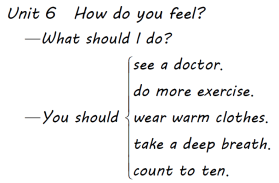人教pep六上英语 Unit 6 The fourth period第四课时教案
The fourth period(第四课时)
Part B Let’s learn & Play card games
![]()
▶教学内容与目标
课时教学内容 | 课时教学目标 |
Let’s learn | ·通过图片、课件等,结合教材中陈杰、吴一凡、Mike和Oliver在不同情境中表现的不同情绪和感受,以及教师、父母和朋友分别提出了针对性的建议来疏导他们情绪的场景,学会听、说、读、写词组:see a doctor, do more exercise, wear warm clothes, take a deep breath, count to ten ·能够熟练运用句型“You should…”提出合理建议 |
Play card games | ·能够根据同伴抽到卡片的内容,提出相应的建议 |
▶教学重点
能够听、说、读、写并熟练运用下列词组:see a doctor, do more exercise, wear warm clothes, take a deep breath, count to ten。
▶教学难点
能够用所学词组和句型来针对不同情况提出合理建议。
▶教学准备
PPT课件、课文录音、视频、卡片等。
▶教学过程
1
Step 1: Warm-up & Revision & Lead-in
 1. Greetings.
1. Greetings.
2. Revision.
Show the pictures on page 60 to students. Talk about the pictures with students.(课件出示:教材P60 Let’s talk板块下方的图片)
Students talk about the pictures in pairs.
A: What’s wrong with you?
B: I’m angry.
A: Don’t be angry. You should take a deep breath.
…
3. Free talk.
Prepare the word cards about “ill, sad, angry, worried”.
Ask several students to choose one card and act it out.
T: What’s wrong with him/ her?
Ss: Are you ill/ sad/ angry/ worried?
S1: Yes. I’m angry. /…
T: What should he/she do? Can you give him/her some suggestions?
Ss: You should…
4. Lead-in.
T: People may meet problems anytime. How to solve the problems? Today we’re going to learn how to give more suggestions to other people.
Write down the topic “How do you feel?” on the blackboard.
 Step 2: Presentation
Step 2: Presentation
1. Look at Picture 1. Learn the phrase “see a doctor”.
Present Picture 1.(课件出示:教材P61 Let’s learn板块的第一幅图)Talk about the picture with students.
T: Who is the girl?
Ss: She’s Chen Jie.
T: How does she feel?
Ss: She’s ill.
T: What’s your suggestion? What does Miss White say to her?
Ss: You should see a doctor.
Write down the phrase “see a doctor” on the blackboard. Use the recording to teach the phrase.(出示课件)
Ask students to practice the phrase like this:
A: Ill, ill. I’m ill.
B: See a doctor, see a doctor. You should see a doctor.
2. Look at Picture 2. Learn the phrase “do more exercise”.
Present Picture 2. Talk about the picture with students.
T: Who is the boy?
Ss: He’s Wu Binbin.
T: Wu Binbin can’t run fast. What does the PE teacher say to him?
Lead students to answer “You should do more exercise.”
Write down the phrase “do more exercise” on the blackboard. Lead students to spell words by syllables.
Use the recording to teach the phrase.(出示课件)
Explain the different usage of the words “more” and “much” briefly.
Ask students to practice the phrase like this:
A: Healthy, healthy. I want to be healthy.
B: Do more exercise, do more exercise. You should do more exercise.
3. Look at Picture 3. Learn the phrase “wear warm clothes”.
Present Picture 3. Talk about the picture with students.
T: What’s the weather like?
Ss: It’s cold.
T: What should Mike do? What does his mum say to him?
Lead students to answer “You should wear warm clothes.”
Write down the phrase “wear warm clothes” on the blackboard. Use the word “pear” to help students spell the word “wear”.
Use the recording to teach the phrase. (出示课件)
Ask students to practice the phrase like this:
A: Cold, cold. It’s cold outside.
B: You should wear warm clothes.
4. Look at Picture 4. Learn the phrases “take a deep breath, count to ten”.
Present Picture 4. Talk about the picture with students.
T: Who are they?
Ss: Oliver and John.
T: How does Oliver feel?
Ss: He is angry.
T: What should Oliver do? What does John say to him?
Lead students to answer “You should take a deep breath and count to ten.”
Write down the phrases “take a deep breath, count to ten” on the blackboard. Use the recording to teach the phrases.(出示课件)
Students read the phrases one by one.
Ask students to practice the phrases like this:
A: Angry, angry. I’m angry.
B: You should take a deep breath and count to ten.
5. Read and act.
(1)Students read after the recording. Pay attention to the pronunciation and the intonation.
(2)Let students practice by acting out in scenes. For example, scenes of being ill, running slowly and panting, feeling so cold, angry etc.
Ask them to work in groups.
 (3)Show time.
(3)Show time.
Step 3: Practice
1. Flashing cards.
Use the word cards to play a game. Students read the phrases as fast as they can.
2. Play card games.
Use the word cards to play this game. Students work in pairs.
Students make some word cards. They write down the words “cold, ill, angry, worried” on the cards.
One student chooses a card and says something according to the card. The other student gives advice to him/her.
A: I’m… What should I do?
B: You should…
Ask several students to show to the class.
 The other students listen and make evaluations.
The other students listen and make evaluations.
Step 4: Consolidation & Extension
“Agony aunt”
1. Create a situation.
Show a picture to create a situation on the PPT. (课件出示:“知心姐姐”的图片)
T: Look! She is the agony aunt. She helps other people. But today she is ill. Can you help her to write back the letter? Let’s see the letters.
2. Give advice.
Show some letters on the PPT.
 Students try to give some advice to them.
Students try to give some advice to them.
Students can work in groups.
3. Write down the advice.
Students write down the advice.
 4. Write back the letters.
4. Write back the letters.
T: Let’s help the agony aunt. We can help her to write back the letters.
Students try to write back the letters.
5. Show the letters.
Choose some students to show their letters to the class. The other students try to find out who is the right person to be the “intimate friend”.
1
▶板书设计

▶作业设计
Copy the phrases three times.
▶教学反思
1.借用上节课的教材图片引导学生进行对话练习,帮助学生复习相关句型,自然导入新课,为后面的学习做好铺垫。
2.充分结合图片和对话引导学生学习新词组。借用多媒体教授新词组,并引导学生用多种方式操练新词组。
3.操练环节利用单词卡片和自制卡片帮助学生操练新词组,并根据实际情况运用所学知识给出合理建议,很好地活跃了课堂气氛。
4.在情境中理解,在活动中运用,突出语用功能。通过创设合理情景,帮助学生在情景中真实自然地使用所学语言,突出教学重点。
![]()
▶Teaching Contents & Teaching Aims
Let’s learn
·Be able to listen, speak, read and write the new phrases “see a doctor, do more exercise, wear warm clothes, take a deep breath, count to ten” by observing and talking about the pictures.
·Be able to make reasonable suggestions by using the sentence structure“You should…”
Play card games
·Be able to give suggestions according to the contents of the word cards.
▶Teaching Priorities
·Be able to listen, speak, read, write and use the new phrases “see a doctor, do more exercise, wear warm clothes, take a deep breath, count to ten” skillfully.
▶Teaching Difficulties
·Be able to use the phrases and the sentence structures they have learned to make reasonable suggestions for different situations.
▶Teaching Procedures
Teaching Stages | Teacher’ s Activities | Students Activities | Teaching Purposes |
Warm-up & Revision & Lead-in | 1. Greetings. 2. Revision. Show the pictures on page 60 to students. Talk about the pictures with students. 3. Free talk. Prepare the word cards about “ill, sad, angry, worried”. Ask several students to choose one card and act it out. Talk with students. 4. Lead-in. | 1. Greetings. 2. Look at the pictures and talk about them in pairs. 3. Several students choose one card and act it out. Talk with the teacher. | Help students review the relevant sentence structures and lead in the topic. |
Presentation | 1. Present the pictures. Learn the phrases. Present Pictures 1~4. Talk about the pictures with students. Use some questions to lead students to learn. Write down the phrases “see a doctor” “do more exercise” “wear warm clothes” “take a deep breath” and “count to ten” on the blackboard. Use the recording to teach the phrases. Use the word “pear” to help students spell the word “wear”. Ask students to practice the phrases in pairs, in groups. | Look at Pictures 1~4 and talk about them. Learn and practice the phrases “see a doctor” “do more exercise” “wear warm clothes” “take a deep breath” and “count to ten”. Point to the pictures and practice the phrases in pairs, in groups. | Lead in the new phrases properly. Lead students to learn the new phrases through the pictures and the questions. |
(续表)
Teaching Stages | Teacher’ s Activities | Students’ Activities | Teaching Purposes |
Presentation | 2. Read and act. (1)Let students read after the recording. (2)Let students practice by acting out in scenes. For example, scenes of being ill, running slowly and panting, feeling so cold, angry etc. Ask them to work in groups. (3)Show time. | (1)Read after the recording. Pay attention to the pronunciation and the intonation. (2)Practice the dialogue by acting out in scenes in groups. (3)Show to the class. | Make sure students can read the sentences correctly and fluently. |
Practice | 1. Flashing cards. Use the word cards to play a game. 2. Play card games. Use the word cards to play this game. Let students work in pairs. Let students make some word cards and write down the words “cold, ill, angry, worried” on the cards. Ask one student to choose a card and say something according to the card. Ask the other student to give advice to him/her. | 1. Read the phrases as fast as they can. 2. Make some word cards. Write down the words “cold, ill, angry, worried” on the cards. One student chooses a card and says something according to the card. The other student gives some advice to him/her. | Use the word cards and the self-made cards to help students practice the new phrases. Use what they’ve learned to make reasonable suggestions according to the real situations. |
Consolidation & Extension | “Agony aunt” 1. Create a situation. Show a picture to create a situation on the PPT. 2. Give advice. Show some letters on the PPT. Ask students to try to give advice to them. 3. Write down the advice. Let students write down the advice. 4. Write back the letters. Ask students to try to write back the letters. 5. Show the letters. | 1. Observe the picture on the PPT. 2. Read the letters on the PPT and try to give advice to them. 3. Write down the advice. 4. Try to write back the letters. 5. Some students show their letters to the class. The other students try to find out who is the right person to be the “intimate friend”. | Create a real situation to stimulate students’ motivation in English learning and develop students’ comprehensive language using ability. |
Homework | 1. Copy the phrases three times. 2. Do the exercises. | ||
1
